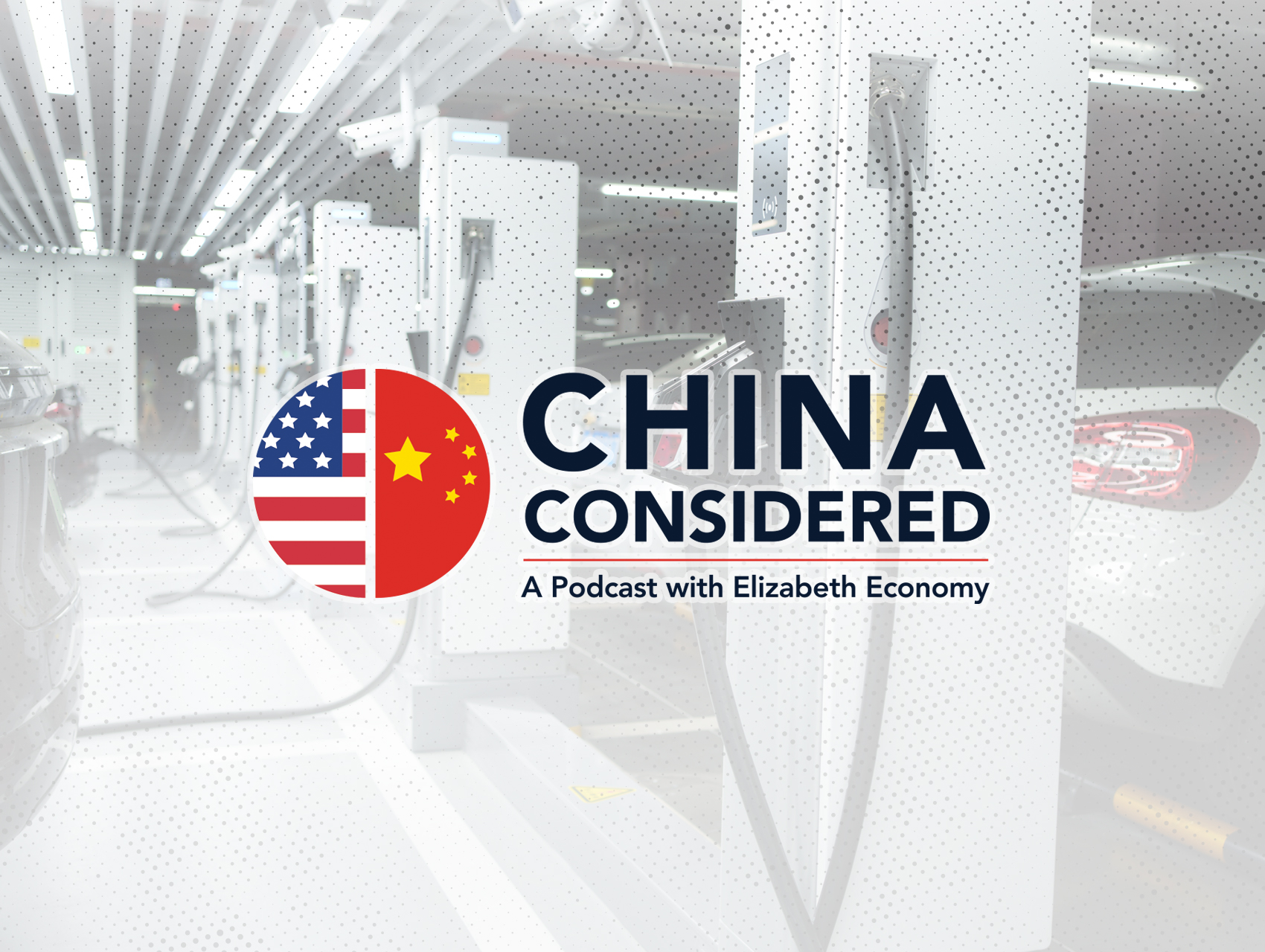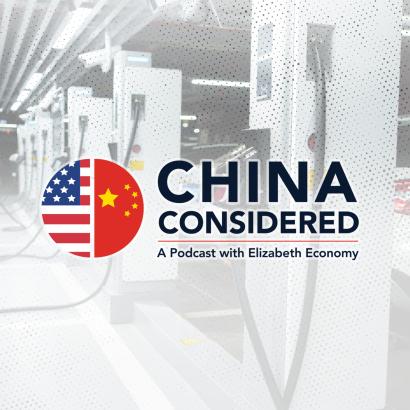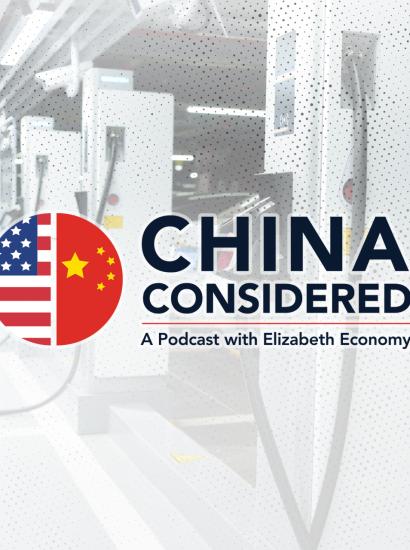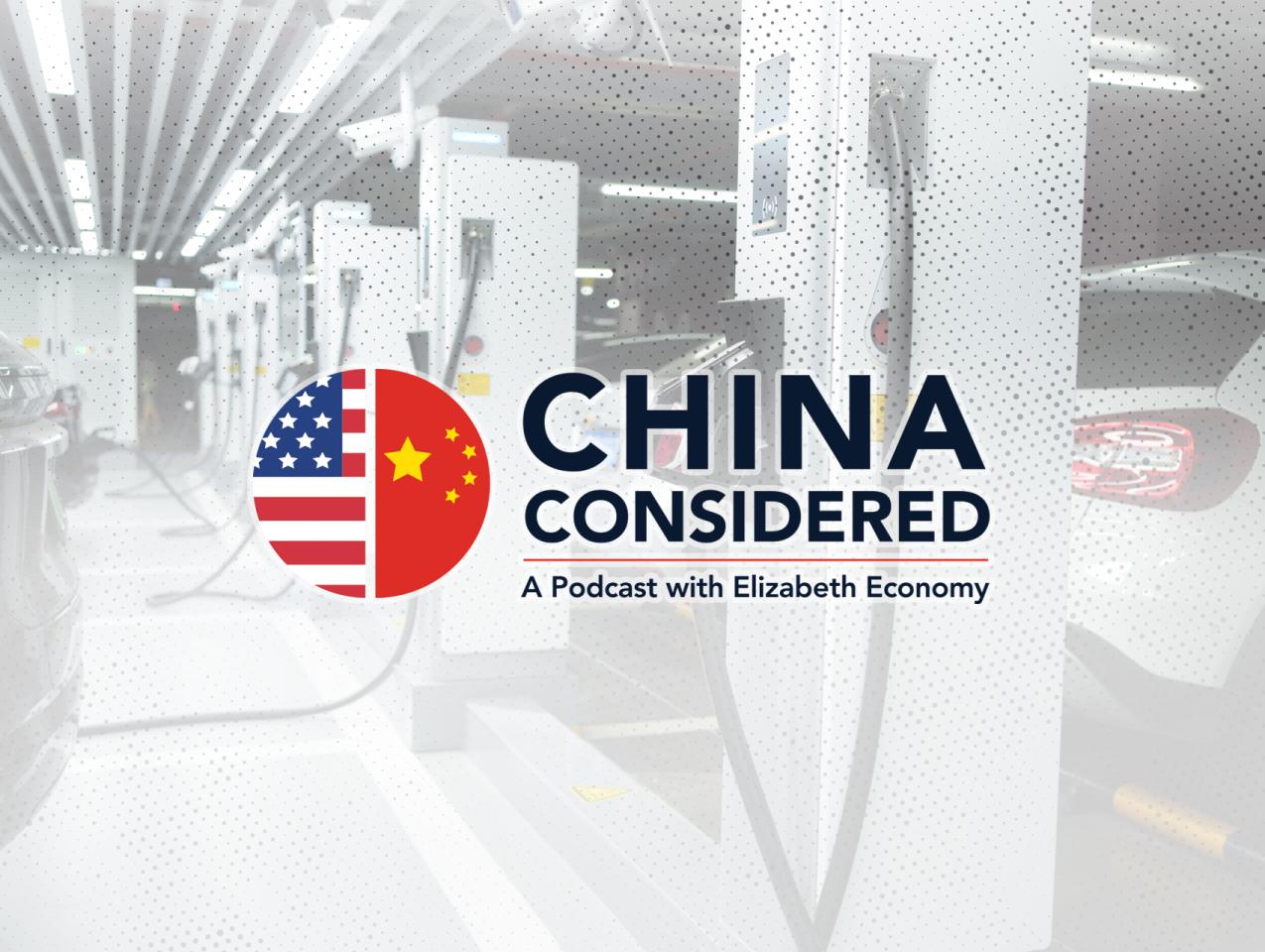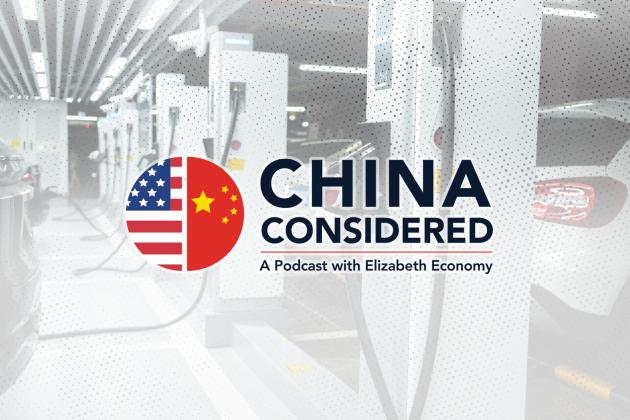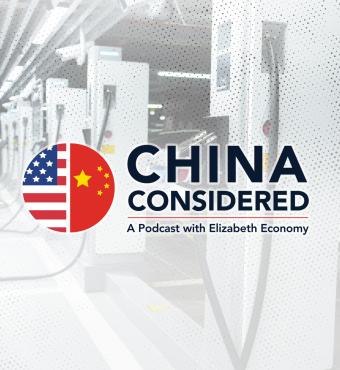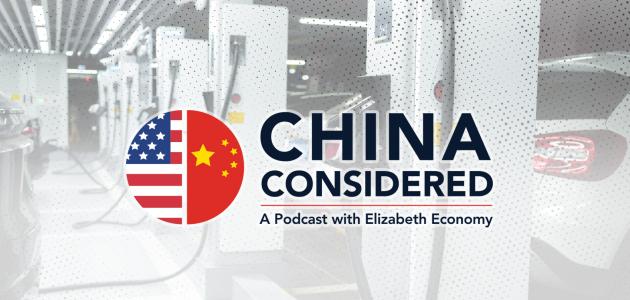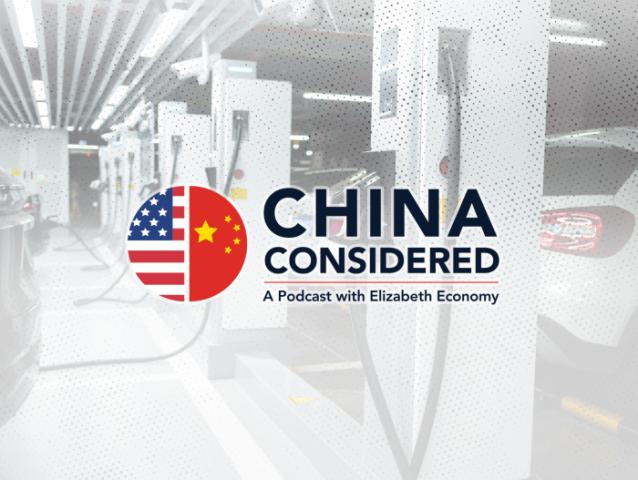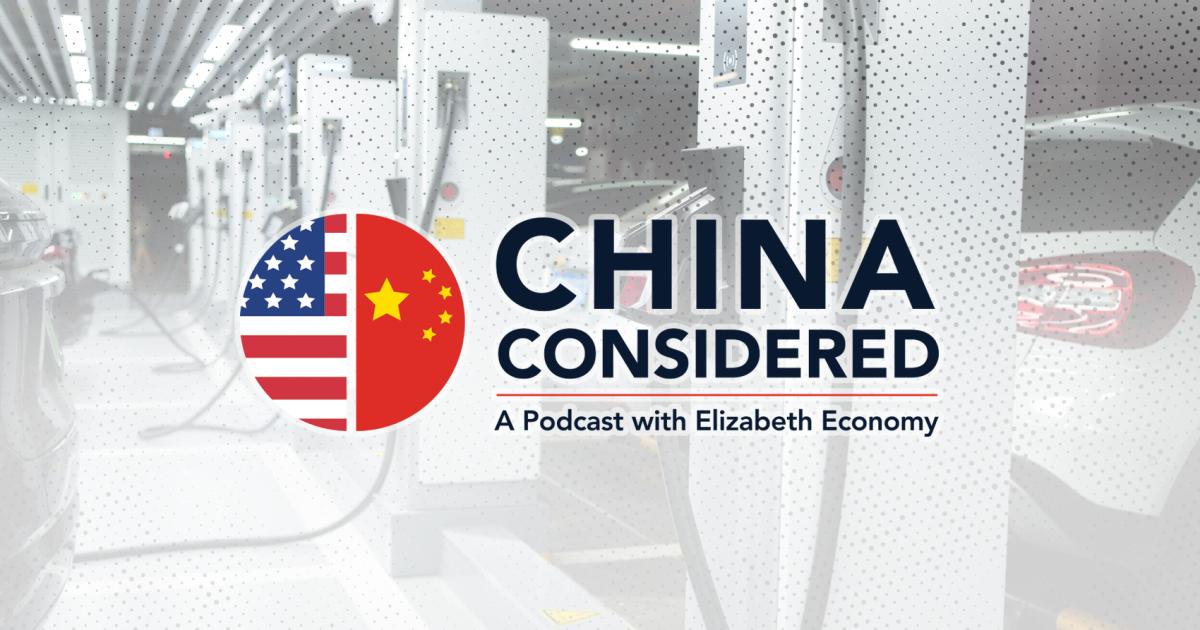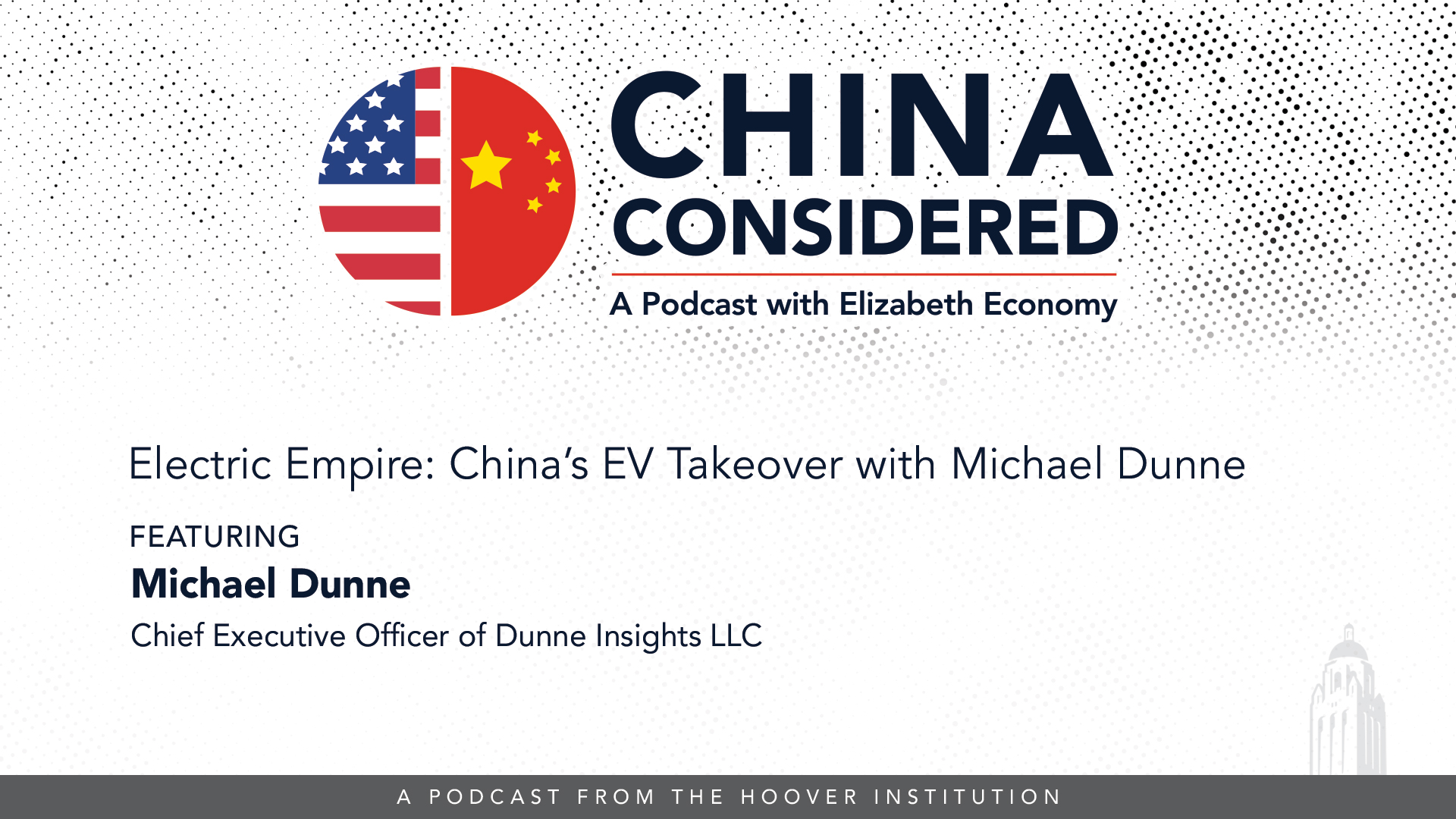- China
- Confronting and Competing with China
Longtime friends Dr. Elizabeth Economy and Michael Dunne sit down to discuss the transformation of the Chinese automobile industry, the roots of electric vehicles in China, the demand for electric vehicles (EV) both in the United States and globally, and how the United States can best compete in a rapidly changing environment. Dunne details the early days of the Chinese EV revolution, a quiet transformation that came to a head at the 2023 Shanghai auto show and has now resulted in China becoming a global leader in EVs. The two also touch on how the conversation around electric autos has shifted from a concern that focuses on climate change on green energy to now one that encompasses national security and critical supply chains. They conclude by discussing how America can best compete in this shifting industry, and how the country must “get out of its comfort zone” in order to do so effectively.
Recorded on April 17, 2025.
WATCH THE EPISODE
>> Elizabeth Economy: Welcome to China Considered, a podcast that brings fresh insights and informed discussion to one of the most consequential issues of our time, how China is changing and changing the world. I'm Liz Economy Hargrove, Senior Fellow and Co Director of the Program on us, China and the World at the Hoover Institution at Stanford University.
Today I have with me Mike Dunne. He's the CEO of Dunne Insights and a world-class expert on all things auto. In particular, he has spent more than three decades as a consultant and thought leader focused on what's going on in the US and Chinese car industries. He has a new book coming out next year called Car Wars.
And there's nobody better to help us understand the current competitive landscape. Welcome, Mike.
>> Michael Dunne: So good to see you, Liz. And I've been looking forward to this conversation for weeks.
>> Elizabeth Economy: Great. So you have been involved in the Chinese auto industry in one form or another since we were in graduate school together in the early 1990s.
Did you ever expect the day would come when China would be the largest manufacturer and largest car market in the world?
>> Michael Dunne: No, China's rise to global supremacy in cars is really nothing short of a miracle. To be honest, what I saw the country do in the space of 30 years, it's like, you know the movie Bad News Bears, Little League players, and they were hopeless.
That was China when I first set foot in Beijing, Jeep's joint venture in 1990. Today, they're feared by all. They've transformed into the New York Yankees, World Series champions, perennial powerhouse, existential threat to global automakers worldwide. Whoa, how did that happen? That's just got everybody stunned.
>> Elizabeth Economy: Right, and that's what you're gonna tell us.
So who's their coach? I mean, who coached them from Bad News Bears to the Yankees in three decades? Is it the government? Was it a set of really incredible Chinese entrepreneurs? Was it the foreign companies who came in and did JVs with their Chinese counterparts? How did this miracle transformation occur?
>> Michael Dunne: Yeah, so government from the very beginning plays that central role of setting the rules and setting the ambition. What are our objectives? So let me take you back just for a moment to when I did go to that Beijing Jeep plant in 1990, what I saw. The manager was still sleeping on cots, taking their afternoon naps.
The cars were barely creeping along the final assembly line. There's a lot of tension between the partners, Chrysler and Beijing Jeep. Beijing officials from the city. And I got to together with a friend of mine, Kerry Ivan, who was the CFO at the time. And I said, what's it like here operating this JV?
And he said, every day's a battle. It's quite depressing, in fact, I asked my assistant, Ms. Jung, how are you doing? Every morning I ask her, how are you doing, Ms. Jung? And she always replies the same way. Just waiting to die, Mr. Ivan, just waiting to die.
Okay, so things were the Chinese were unhappy because they didn't have the wherewithal to build their own vehicles. They had to import the parts from Ohio, assemble them in China. Later that same day, I met the plant manager, and I said, how do you feel about this? You're not able to build your own Chinese cars.
You're relying on the US for parts. And he said, you know what? It's okay for now until we learn how to do it ourselves and kick your asses out, really.
>> Elizabeth Economy: So even back then, they had that as a motivation.
>> Michael Dunne: Even back then, there was that deter.
Quiet determination, like a burning ambition. We understand we're way behind today, but we. We know where we wanna take things. That was then government. Deng Xiaoping famously went and took a visit to the United States in Japan, in the. When was that? Gosh, 1980. And what he came away with is wealthy countries, powerful countries, have very strong auto industries.
We want that for ourselves. So he came back and he told his lieutenants, hey, let's do that. And they said, great, boss, but we don't know anything about building cars. We don't have capital, we don't have the technology, the management expertise. He said, okay, you know what we need to do?
Let's form joint ventures. Let's go out and recruit people from the West, Americans and Germans and Japanese to come here to China. And here are the rules. They won't be allowed to export into China. We'll have tariffs of 100% or more. And if they want access to the Chinese market, they'll have to manufacture inside China.
Okay, that's interesting, we have to bring the capital and the know how inside. And, by the way, not only do they have to manufacture here, but they have to partner with a Chinese company, and that Chinese company will have at least 50% ownership in every single one of these JVs.
Wow, okay, so on the one hand, Westerners thought, China's opening up. We can get into the market. This is awesome. But what they failed to see was that China was ultimately in control. They had the ace in the hole, they were in charge.
>> Elizabeth Economy: So, Mike, let me interrupt you just for a second.
I mean, did they have a model for this, or did Deng Xiaoping and his advisors simply create this idea for a JV structure that would enable their companies over time to absorb the technology and the knowledge and everything else they would need to become their own dominant player?
Or was there someone else who had done this before in this way?
>> Michael Dunne: You're absolutely right. They looked at Japan, they looked at Korea, and the Japanese and Koreans had formed joint ventures with Americans primarily and had successfully learned what they needed to learn until they could stand on their own.
So there was precedent for it. The difference might be that, you know, China was insistent, we're not going to have any imports here. We're going to manufacture it ourselves, and we have to own at least 50%. So it really put solid lines in place. There was the precedent out of Japan and Korea.
So, yes. So how does that play out from 1990, let's say, until 2010? It goes spectacularly well for China and for the global automakers entering China cuz the market exploded from a few thousand cars a year to, by 2010, they were building more than 10 million a year, surpassing the United States in terms of production for the first time.
So I remember attending a summit at that time and led by a guy named Wan Gang, a very important character in China.
>> Elizabeth Economy: I've met him myself, I remember Head of the Ministry of Science and Technology, former auto guy, right?
>> Michael Dunne: Right.
>> Elizabeth Economy: Yeah.
>> Michael Dunne: So it's in Beijing and he's up in front, he goes, I have some great news that I have some disappointing news on the great news side, we're now the number one manufacturer of vehicles in the world.
We're the biggest market in the world. We're number one. This joint venture strategy, actually, we got the capital and the know how here, he said. On the other hand, there's two things that I'm really frustrated about. One is, if you look out in the streets of Shanghai or Guangzhou or Beijing, almost all those cars are still foreign makes, Mercedes and Hyundai and Toyota and Buick.
Where are the Chinese cars? Yeah, 20 years later, we're still not making a car to call our own. That was one big frustration. The second one was, hey, by the way, we're now the largest importer of oil in the world. We're becoming increasingly dependent on oil from the Middle East.
We don't wanna find ourselves in the same kind of quagmire that the United States has found itself in. So how do we move off this joint venture arrangement to something bigger? Bigger, yeah? And so in 2010, we begin to see the seeds planted for, let's move to electric vehicles.
>> Elizabeth Economy: Now.
>> Michael Dunne: Of course, they looked across the ocean, they saw a guy named Elon Musk with Tesla, and, there's some possibility here. Maybe technology's ready. So what do they do next? Do you know the answer?
>> Elizabeth Economy: I don't know, did they invite Tesla? I actually think, though, I seem to remember the story begins a little bit earlier than 2010 for EVs, right?
I mean, I think they started thinking about new energy vehicles as early as the late 1990s.
>> Michael Dunne: You're exactly right.
>> Elizabeth Economy: They just couldn't get anywhere, right? And then I do kind of know the story of the EVs cuz I looked into it when I was writing one of my earlier books.
So I know it was a big mess of government investment and local government investment and a lot of other stuff that took place. But let's hear it from you, cuz I think the world went into collective shock in 2023 after the Shanghai Auto Show, right?
>> Michael Dunne: Yeah, totally.
>> Elizabeth Economy: It was like, my God, where did all these Chinese EVs that are nice to look at, that are technologically excellent and run well? Where did they all come from? They just did this overnight, but it wasn't overnight. Okay, so tell us-
>> Michael Dunne: Seemingly overnight.
>> Elizabeth Economy: Tell us the story was not overnight.
>> Michael Dunne: No, you're absolutely right. Let's go back, 2000 Wan Gang comes back from Germany and he delivers this white paper, the strategy paper, we should actually go electric. He knew then, 2000. And then a few years later, Wang Chuanfu, the founder of BYD, battery maker for cell phones, announced to his board, we're going into electric vehicles, that's 2003.
His board says, you're out of your mind. We won't be competitive. It's capital intensive. We don't know anything about cars. Yes, we're going into cars even before they had wherewithal to build the batteries to power the car. So he bought a car company and he bought Mitsubishi engines for that car company as a stop cap until he was okay.
>> Elizabeth Economy: Yep.
>> Michael Dunne: So fast forward back to 2010 and we're gonna get to today pretty quickly. But in the first few years, what they did is they went to the foreign investors like GM and Toyota and others and said, we're going electric and you need to form new joint ventures, transfer your electric technology, and we'll be off and running.
And the global automaker said, yeah, no, we'll sign up for it, but nothing's gonna happen. So for the next five years, there's a lot of wheel spin. Not much happened until made in China 2025, Xi Jinping gets together with lieutenants and says, how do we really win the future technologies around EVs and batteries?
We're going to have to do this ourselves. And they put to it tens of billions by some measures, hundreds of billions of capital into charging systems, into batteries and battery supply chains. And we will have our own brands and we'll have our own technology. So that was the beginning of it.
It's kind of like Deng Xiaoping's thing about crossing the river by feeling the tone.
>> Elizabeth Economy: Feeling the stones, yes.
>> Michael Dunne: That miracle that we've seen has never been a straight line. So for the next several years, there's a lot of corruption, fraud. Do customers really want EVs? Not really, the manufacturers aren't excited to build them cuz they can't make money on them.
The government's pouring billions into it. It's a lot of question marks, how do we actually get-
>> Elizabeth Economy: Absolutely.
>> Michael Dunne: Yeah, and as recently as 2019 2019, I met with the CEOs of Chinese automakers saying, electrics I'm not sure they're the future. Enter Tesla. The Chinese government officials had been making visits to California to talk to the Air Resources Board here, UC Davis, people at UC Davis and Tesla, and they saw, Tesla's got traction here in the us how did that happen?
What if we invited Tesla to come into China? That's exactly what they did. Starting in 2020, the miracle begins in 2020 when Tesla begins manufacturing the Model 3 in Shanghai. I saw that the customers in China's perceptions of what an electric vehicle could be completely changed. In China, where it's all like a school of fish are going here and then they go, everybody's going there now.
And right out of the gates, red hot demand for Tesla. And suddenly electrics went from, do we have to do this to wow, I can't get wait to get my hands on a Tesla or some other cool new brands that are Chinese.
>> Elizabeth Economy: Right.
>> Michael Dunne: The Neos and XPengs.
And then we went into Covid Liz, as you said, and everybody kind of okay, something's going over there in China. But we didn't really track it closely until 2023, as you say. Shanghai Auto show reopens to the west and it's a complete and utter shock to all the executives visiting saying it used to be the global brands took center stage.
Now it's the Chinese brands that they've got product, they've got good looking quality products at low cost. How did this transformation happen so quickly? But it had been building for years and what ignited demand was the presence of Tesla.
>> Elizabeth Economy: It's so interesting, honestly I hadn't realized it.
I do remember that in Shanghai and Beijing that they were giving advantages like incentives to people to get electric cars by making the license plates contingent, right? So there a huge demand for license plates to be able to have a car in Shanghai and Beijing cuz of the traffic, they didn't want more cars.
But if you had an electric car, right, you could get a license plate in Shanghai or Beijing. So I think there probably were some other smaller incentives that the local governments and maybe the central government were putting in place to try to help. But I take your point on Tesla and Tesla's a nice looking car, it's got a great ride and I'm sure that that also helped to sort of change the perception of the Chinese.
>> Michael Dunne: Change of perception, you're absolutely right. Those incentives at the local level in Shanghai you got a free license plate instead of paying 10,000. Those were in place, but they were getting expensive for the government. And then the transformative effect of Tesla wasn't just that it was another electric car, but it was what we call a software defined vehicle with that big center stack screen that allows Tesla to update your car over the air just like you have updates on your phone.
And this was mind blowing for your Chinese consumers. So it wasn't just that it was battery powered, but it had all these other cool features. And then the Chinese automaker were able to quickly duplicate, copy, or whatever word you wanna call it and get on that train.
>> Elizabeth Economy: So that's the story.
And here we are today, where China now dominates, right? The largest EV market and also exporter of EVs globally. And I think I read recently that BYD surpassed Tesla as the largest manufacturer of EVs this last year, 2024. So Tesla doesn't even hold sort of reigning champ anymore.
Okay, so let me ask you one question about Made in China 2025. A little bit off the topic of cars, but it occurs to me if you look at solar panels, you look at wind, you look at EVs, you look at batteries, all of these also are made in China 2025 technologies.
There are still a lot of Made in China 2025 technologies yet to come. Right, we've got semiconductors, we've got new materials, we've got AI. Should we expect that we're gonna see this same kind of first Chinese dominance of the market and then global dominance in all of these industries moving forward?
Is this what we have to look forward to for the next three to five years?
>> Michael Dunne: That's the not so secret master plan that's been developed in Beijing and they're hell bent on seeing it through. That they would dominate all of the above, from autonomous vehicles to AI, to chips, to batteries, to electrics.
And because I'm closest to cars, it's just we're ten years and 10x behind China when it comes to electric cars. They build 10 million a year, we build a million. They utterly control the battery supply chains from mining, to processing, to cell manufacturing, accounting for 70% of, so, yes, this is the first of many industries that China's targeted.
Yes.
>> Elizabeth Economy: So what are American car companies, what are European car companies? What are they doing at this point to try to compete and are they doing things differently? I had Jord Butka on podcast a couple of months ago and he seemed to suggest that the Europeans are adopting a very different model in terms of thinking about how to compete with China.
Much more learning from China and integrating China into the European car manufacturing. So how do you see this competition evolving? And if we're 10x behind, is there any chance of catching up?
>> Michael Dunne: So you're absolutely right, Europe has taken a different tack for different reasons. They engage with the Chinese.
So Volkswagen has invested in Xpeng, an electric startup. Stellantis has invested in Leap Motor, there's a lot of talk with Mercedes trying to cooperate and do more R&D in China, just as Jorg puts it. It's like he calls it the fitness gym. And the Europeans, the Germans in particular, think we really need to stay engaged with China and allow them to come to Europe in order to remain competitive.
So for better or for worse, that's Europe's tack right now. On the other hand, here in the United States, we've taken a very, let's call it timeout, defensive measure, we need tariffs in place. We don't want any Chinese competition in our home market. That could be the beginning of the end.
So we have these 100% tariffs. Wait a second, what's today, maybe 240.
>> Elizabeth Economy: More, we got more now.
>> Michael Dunne: Right.
>> Elizabeth Economy: Yes.
>> Michael Dunne: So we're really hard.
>> Elizabeth Economy: 145% tariff, yeah.
>> Michael Dunne: Yeah, we're really hard lying in the sense that we're not ready for and we don't want Chinese competition.
So if you look at the map, the world is in terms you mentioned China is the number one exporter of vehicles globally, surpassing Japan and Germany. They export to virtually every market in the world except for the United States and Canada. So the US, has said we need to buy time.
Now the question is, how do we become once more globally competitive? Because the reality is the Detroit Three are very good at making big pickup trucks and SUVs. But step outside of the United States, Southeast Asia, Africa, South America, we're not competitive anymore. And that's a huge, huge problem for our industry.
Tesla's the exception, and they're the hope, they're competitive globally.
>> Elizabeth Economy: They're expensive, right, compared to what the Chinese can produce?
>> Michael Dunne: Yes. The Chinese are able to manufacture EVs at about 25% lower cost than most other automakers in the world, and they're doing it higher and higher levels of quality.
So it's real when the CEO of Ford Motor Company, Jim Farley, says it's the next essential threat, he's not kidding. Yeah.
>> Elizabeth Economy: So what are we doing aside from putting the tariffs time out looking around the room, okay, what do we do now? We found ourselves in space, in our market of 400 million people.
>> Michael Dunne: Yes.
>> Elizabeth Economy: But what's the game plan here?
>> Michael Dunne: Game plan. Under the Biden administration, very important moves were put in place to encourage investment in our own battery belt. And in fact, it was quite successful. Over $100 billion were invested across the southeast United States up into Ohio, Michigan.
That's big money, that's probably the biggest industrial investment the United States has seen in a generation.
>> Elizabeth Economy: And this was private money, public money, I mean, government money mix. What was the breakdown here?
>> Michael Dunne: There were in the IRA, there were incentives for manufacturers to invest. They would get tax breaks and other things, but it was largely predominantly private money, joint ventures between, for example, GM, Ford, Stellantis, Toyota and partners from Japan and Korea.
So this was a good news, that's huge. The tougher news is that we need demand for EVs. And just like China struggled with demand, United States finds itself, well, the average consumer doesn't really love EVs yet. Maybe on the coast, maybe some Teslas, but we don't have the number of offerings at the right price points to really generate that demand that any investor in the battery facilities would need.
I'm building batteries, this is great, who's buying them? And that's where we are today under the current administration, Trump administration, it looks like we're moving away from incentives to buy EVs and we're stuck at about a million cars a year that are EVs. This is a big hurdle for us to clear.
How do we generate demand for EVs, so that we can incentivize investment in battery and battery supply chains, critical minerals processing and all the rest. That's where we are. We're at this juncture where we have to figure that out.
>> Elizabeth Economy: Right and it seems the Trump administration, in addition to eliminating, I think there were some subsidies for people buying EVs as well that involved right in the IRA.
And I think they said they were booming flows, but I guess they're not that interested in that sort of clean tech space writ large, right? I think this is not something they seem to be committed to. So does is that just gonna set us back another 10x in terms of our ability to compete?
I mean, can our car companies, can those nascent battery companies, can they continue without the subsidies for consumers and the incentives of the IRA and so will they be able to move forward?
>> Michael Dunne: It's looking tough right now, but the conversation is shifting from hey, let's do this because it's good for the environment to let's do this because it's essential for national security.
When you think about the future of our national defense, from submarines to night vision to communications to navigation to drones, all of these are powered by batteries. And we need to have our own capabilities to produce those batteries. And right now our cupboard is largely empty. We're totally dependent on China.
That's really strange, it's like to use and now say, Winston Churchill, 1939, the Germans go, we can supply you with all kinds of tanks and cars, whatever you like, you choose. And we're going, no, but we should be making our own.
>> Michael Dunne: Right?
>> Elizabeth Economy: Okay, that's a really frightening analogy, Mike, but okay.
>> Michael Dunne: That's who I think in a way, if we're really being honest. That's how vulnerable we are. The Churchill went in there and he saw we don't have the capability. We gotta get our capabilities up. And that's where the US is today with regards to we. Even if you don't like EVs, we need those batteries, critical minerals batteries and those capabilities to support our national defense.
>> Elizabeth Economy: So in the interim where we don't have batteries and we're not making our own and we're reliant on China. I know there was a lot of discussion in the last administration and I'm not sure there was any real resolution about whether or not we ought to welcome investment from CATL, which is major Chinese battery maker.
I think has about a third of the global market share. And they were interested, I think, in building companies doing a joint venture in the United States in a couple different places. And I think a couple of governors initially welcomed the idea. Then there's a lot of sort of political consternation around this.
Where do you stand on whether we should welcome CATL to come in and if we do welcome them, what kind of restrictions or what kind of regulations should we be putting on them in terms of what do they need to do here? Do they need to transfer their technology?
Do they need to set up an R&D facility? All the kinds of things that China made US companies do when they went in. Is that the answer or is it better just to keep them out for the time being? Because once they're in, they're just gonna end up dominating the market here.
>> Michael Dunne: Can we go to the next question? That's a great question, goes right to the heart of the matter. So kind of an easy solution, short term is let's bring them in and try to duplicate what China did and say, hey, you're here to build, operate, and transfer within ten years.
You'll have a ten year run, will you make a lot of money, after ten years we must have the American equivalent of what you do, CATL. That's the goal, everybody understand? So that looks tempting, but it would require enormous, what do you call it, tenacity by the American partner to actually wrest that technology away and stand on its own.
So I'm not sure that would happen. And then I go to okay, your second option. Keep them out maybe because ultimately we have to figure this thing out ourselves. Let's not use a crutch, let's face reality. We're way behind. And the Chinese themselves tried to wrest the internal combustion engine technology from the foreigners for decades and it didn't work.
So it's not a perfect analogy, but the point is that we need to be able to stand on our own. We were the original inventors of lithium ion batteries, you have the capacity here, I'm not sure bringing CATL, what does that actually do for us as opposed to what benefits it generates for CATL?
On balance, I'd prefer us to work with other partners to get the job done.
>> Elizabeth Economy: And other partners would be the South Koreans and the Japanese, who also have battery technology or other partners, meaning our own companies here in the United States. And we just need to get moving.
>> Michael Dunne: Japanese and Koreans, Koreans in particular, very strong in this area. They're not as strong as the Chinese in this chemistry called LFP, but that can be solved. And then in the meantime, yes, we want to develop and cultivate our own supply chains here. So that's a lot of opportunities for startups around the country.
Let's do it ourselves. Let's not be lazy.
>> Elizabeth Economy: Okay and then let's take one step sort of further down in the supply chain and sort of all the critical minerals that are necessary for EVs. China doesn't sort of dominate in the mining space entirely, except with the exception maybe of graphite.
But the processing, they certainly do.
>> Michael Dunne: Yes.
>> Elizabeth Economy: So where do we stand right now in this world of access to the sort of critical minerals that we need for EVs and in the processing, what's the timeframe that it would take either for us or for trusted allies and partners to get up to speed so that we're not dependent on China?
Because we can see very clearly, in the midst of this tariff war that China has moved from licensing on the export of things like some rare earth elements to basically a ban. So I think we've got some big issues that we need to deal with and very quickly.
>> Michael Dunne: China's shown it, shown its hand, it's ready to use that leverage, so let's face it, let's not be naive. Five years, I think it would take a five year plan, probably seven. The sourcing the materials is not the biggest issue. There's plenty of lithium around the world, including here in the United States.
Rare earths are actually not that rare.
>> Elizabeth Economy: Rare, right.
>> Michael Dunne: We can find the rare earth materials, so that's not a showstopper. Just as you said, the choke point is processing. So virtually every battery, sooner or later, all roads lead to China for processing. How do we get more processing here, we would need to relax regulations around processing because it's not the cleanest business in the world.
And then secondly, back to our earlier discussion. We need the demand for EVs to justify the investment in processing here. Otherwise, we've got beautiful processing plants and battery plants, but without a customer, it's really hard to scale everything up. Yeah.
>> Elizabeth Economy: So that sounds a little problematic to me, given the current administration.
>> Michael Dunne: It's does.
>> Elizabeth Economy: Not clear to me that they're gonna do anything to enable that demand to sort of drive production.
>> Michael Dunne: Unless you definitely agree, Liz. Unfortunately, that's where we are today. Unless you really start to think ambitiously and say, let's reinvent the American auto industry and take it to where it's globally competitive because there's gonna be demand for electric vehicles globally.
>> Elizabeth Economy: Exactly.
>> Michael Dunne: As the United States, let's get started there. Let's win in South America, let's win in Southeast Asia, let's win in Europe. And then the US will come along and electrics will become more acceptable as charging improves all the rest. But don't just stop and say, well, we don't have it here at home, so we're out.
>> Elizabeth Economy: I have to say that' the one puzzling thing I think right now is just not seeing, even forgetting just about EVs, but the entire space of clean tech and clean energy as just an incredible global sort of growth story. And how we don't want to enable our companies to be not only competitive to be, but to be best in class and why we're not putting in sort of the enabling features to accomplish that.
I wonder whether there's anyone in the government who's right now who's thinking in those terms. I don't know if you've had any conversations with people that are currently in the Trump administration or whether you have a sense for, a direction where some might be pushing in this direction.
>> Michael Dunne: Some are, I was in D.C last week at a very important summit called Safe Summit 2025 that securing America's Future Energy. A lot of bright people were there talking about how we become globally competitive again. So there are voices, I think the United States has to get out of its comfort zone of complacency here at home.
So if we take the Detroit Three, for example, the CEOs of Ford, GM and Stellantis, they make $30 million a year by delivering big trucks and SUVs here in North America, where all the profits are made. Hey, that's great for them. I'm looking for a leadership that says we want to be globally competitive again, and that's the ingredient we're looking for to get there.
Right now, the Trump administration is probably leaning, hoping for the reincarnation of the 1950s.
>> Elizabeth Economy: Right.
>> Elizabeth Economy: In just about every industry, it seems, maybe. I don't know. There are a lot of smart people in the administration. I'm just not quite sure how they've got AI, big investments in AI and talking about that, they've got semiconductors, I know on their mind.
But the rest of the innovation field and sort of global leadership, I haven't heard much coming from them yet.
>> Michael Dunne: Does Elon Musk, is he part of the administration or not? Or he's on the side. He could be a force. In particular, just this last week, he said two things.
One is we should have zero tariff relationship with Europe, which I thought was highly significant for him, the timing of that. The second one, he said the factory is the product of the future. So he's less focused on the cars that he makes and more focused on how does America become the best in manufacturing.
What's implied is as good or better than China. So he has great innovative capabilities, of course. And we do have that guy on our team. He's in America, he's building Tesla electric cars.
>> Elizabeth Economy: Okay, let's move him out of DOGE and into the innovation space, how about that?
>> Michael Dunne: Yes, perfect.
>> Elizabeth Economy: I think, we could probably both agree that his time and energy and intellect could be very well deployed in thinking about America's future innovation strategy.
>> Michael Dunne: Absolutely.
>> Elizabeth Economy: So let's see if we can't get him to be Mr. Innovation instead of Mr. Government Efficiency.
Okay and I'm gonna come to what, honestly, though, listening to you, I'm thinking to myself, what we really need then is for Mike Dunne to move out of the consulting and writing business and into the big three car maker leader, CEO business. Maybe we can find a way to facilitate that, okay.
>> Michael Dunne: What did Mao say? A revolution's not a tea party. So the tea party in Michigan would be over. Would be over. It's time to break some eggs and do all that.
>> Elizabeth Economy: Yeah, break some eggs, break some glass, break some China for your tea party. Okay, all right, last final questions that I ask everybody.
So quick answers.
>> Michael Dunne: Yes.
>> Elizabeth Economy: What book or article would you recommend on China? Would you recommend that people read, what's top of mind for you right now?
>> Michael Dunne: So many good ones out there. I would go first of all to, To Change China by Jonathan Spence.
>> Elizabeth Economy: Okay.
>> Michael Dunne: Where he tracks the lives of some over the last several hundred years. Really talented Westerners, scientists, politicians, artists who go to China with really big ambitions to make it a better place. They're still looking for one of them that might be successful. So check that out, really good book.
>> Elizabeth Economy: Sounds like a good starting point for anybody, okay.
>> Michael Dunne: Okay, so if you're going that way.
>> Elizabeth Economy: All right.
>> Michael Dunne: Second book, I know we're moving fast here, Liz. It was published in 2021, The World According to China.
>> Elizabeth Economy: All right, Mike.
>> Michael Dunne: Yes.
>> Michael Dunne: And absolutely, why?
>> Elizabeth Economy: No, no, no.
>> Michael Dunne: Yes, by Elizabeth Economy, why? Because up until very recently, figuring out China was How to Change China, Jonathan Spence's book. Now China's coming at us and it wants to write the rules and be in charge. We shouldn't have any illusions about that and we're very lucky to have your book to point that out to us.
Hey, read Liz's book. It's right on target. It's so important and getting more important by year.
>> Elizabeth Economy: Okay, thank you for that unpaid advertisement. All right, what issue do you think we don't understand about China? What do we not know enough about when it comes to China? I mean, the universe is vast, I'm sure.
But what really important issue do you think?
>> Michael Dunne: I think that there's an asymmetry. The Chinese know way more about us than we know about the Chinese but people have talked about that before. I think the more important one, the one that comes to mind, is Lu Xun's writings 100 years ago.
He wrote, Chinese people see foreigners either as gods or barbarians and never as equals. In my experience, living in China, that has been so true. So my first year in China in 1986, I'd walk up to the post office, get in line. There's a Laowai here, get him to the front of the line.
No lines for them. My most recent visit to China, 10 Cent. Yeah, okay, what do you guys got? You got something? Cuz we're busy, and almost verging on, I wouldn't say disdain, but sort of ambivalence. We're kind of tolerating you guys at this point. So why is that important?
Because we like to think that China is becoming. We're all equals and we're all gonna meet, common ground, but maybe not. Maybe we have to understand where they're coming from.
>> Elizabeth Economy: No, I mean, I think that is an incredible insight and demonstrates a really precipitous fall, frankly for Americans.
And I think actually a really important insight for the current administration, which I'm not sure appreciates the way that China may be looking at the United States today, may be radically different from the way that they think that power balance is. All right and what about President Trump?
You've offered lots of interesting pieces of advice and thoughts about what the US should be doing differently, what we could be doing differently. But if you were sitting right next to President Trump and had him for a minute and you wanted to say this is what we have to do now, one, two, three.
What would that advice look like?
>> Michael Dunne: First off, I don't mind the tariffs. I don't mind them.
>> Elizabeth Economy: Okay.
>> Michael Dunne: We need to buy some time. And if you look at the most successful auto industries around the world, Germany, Korea, Japan, China, they're all heavily protected through tariffs and non tariff barriers to consolidate power at home and then become an export machine.
So the tariffs are probably an essential. No one likes tariffs, cuz they add costs. May be required, protect the home market. Then second and harder part is, let's get globally competitive. Let's pick an area, South America or Southeast Asia. We're going to dominate those auto markets in the future.
That's where the growth will be. Let's be first in those markets. And that means designing engineering, developing products that are competitive globally, not just here in the United States. That would be the advice, simple.
>> Elizabeth Economy: Okay, smart, okay. I take it and I think he'd like to hear that part on the tariffs because all he's getting is a lot of push back.
>> Michael Dunne: That's my strategy, yeah, tariffs.
>> Elizabeth Economy: I think that'd be a good way to get him to listen to you.
>> Michael Dunne: Awesome, genius.
>> Elizabeth Economy: Maybe you can write that up, actually, maybe start with that. It's not a bad idea. All right, last question. What do you think is the likelihood of sort of Nixon Mao moment between President Trump and President Xi?
One to ten, how likely are we to see a real breakthrough in the US-China relationship in the next couple of years?
>> Michael Dunne: One to ten, I'd go a negative two.
>> Elizabeth Economy: Okay then.
>> Michael Dunne: Yeah, I just don't see them coming together. I think they both wanna be the guy in charge.
>> Elizabeth Economy: Yeah.
>> Michael Dunne: Uh-huh.
>> Elizabeth Economy: Okay, on that not terribly optimistic note, let me thank you for taking the time to speak with me. I mean, always engaging, always insightful. Really, you are best in class. So really appreciate your taking the time, Mike, and hope that the administration does listen to what you have to say.
Because I think it's really important that we get this right. And this is, I think, the inflection point. And if we don't get it right now, we may be out of the game for decades to come. So thanks very much for coming. And if you enjoyed this podcast and want to hear more reasoned discourse and debate on China, I encourage you to subscribe to China Considered via The Hoover Institution YouTube channel or podcast platform of your choice.
ABOUT THE SPEAKERS
Michael Dunne is the Chief Executive Officer of Dunne Insights LLC, an advisory firm with expertise in global electric vehicle markets and battery supply chains. He is also an LP at Assembly Ventures, a Michigan-based venture capital company. Dunne is the author of the Wall Street Journal acclaimed book, American Wheels, Chinese Roads. Dunne was previously the President of General Motors Indonesia and, before that, the Managing Director of JD Power operations in China. He worked in Asia for 25 years as an entrepreneur and an executive in China, Vietnam, Thailand, and Indonesia.
Elizabeth Economy is the Hargrove Senior Fellow and co-director of the Program on the US, China, and the World at the Hoover Institution. From 2021-2023, she took leave from Hoover to serve as the senior advisor for China to the US Secretary of Commerce. Before joining Hoover, she was the C.V. Starr Senior Fellow and director, Asia Studies at the Council on Foreign Relations. She is the author of four books on China, including most recently The World According to China (Polity, 2021), and the co-editor of two volumes. She serves on the boards of the National Endowment for Democracy and the National Committee on US-China Relations. She is a member of the Aspen Strategy Group and Council on Foreign Relations and serves as a book reviewer for Foreign Affairs.
FOLLOW OUR GUEST ON SOCIAL MEDIA
- Follow Michael Dunne on X: Michael Dunne
- Follow Michael Dunne on LinkedIn: Michael Dunne
ABOUT THE SERIES
China Considered with Elizabeth Economy is a Hoover Institution podcast series that features in-depth conversations with leading political figures, scholars, and activists from around the world. The series explores the ideas, events, and forces shaping China’s future and its global relationships, offering high-level expertise, clear-eyed analysis, and valuable insights to demystify China’s evolving dynamics and what they may mean for ordinary citizens and key decision makers across societies, governments, and the private sector.







